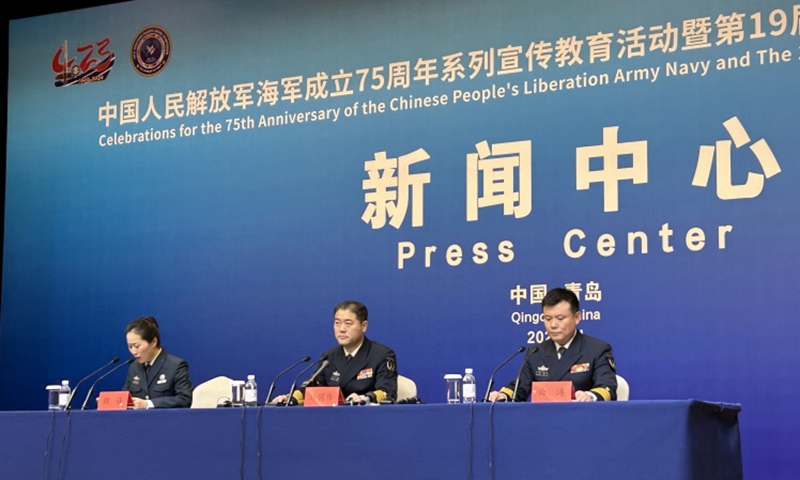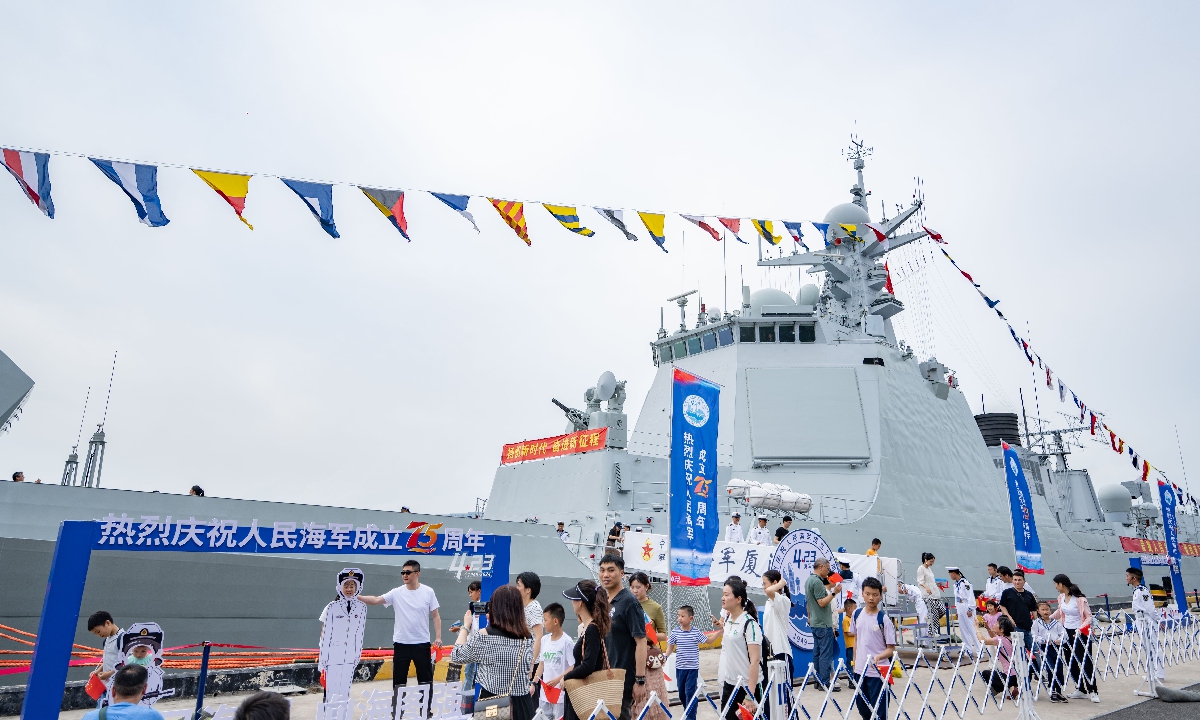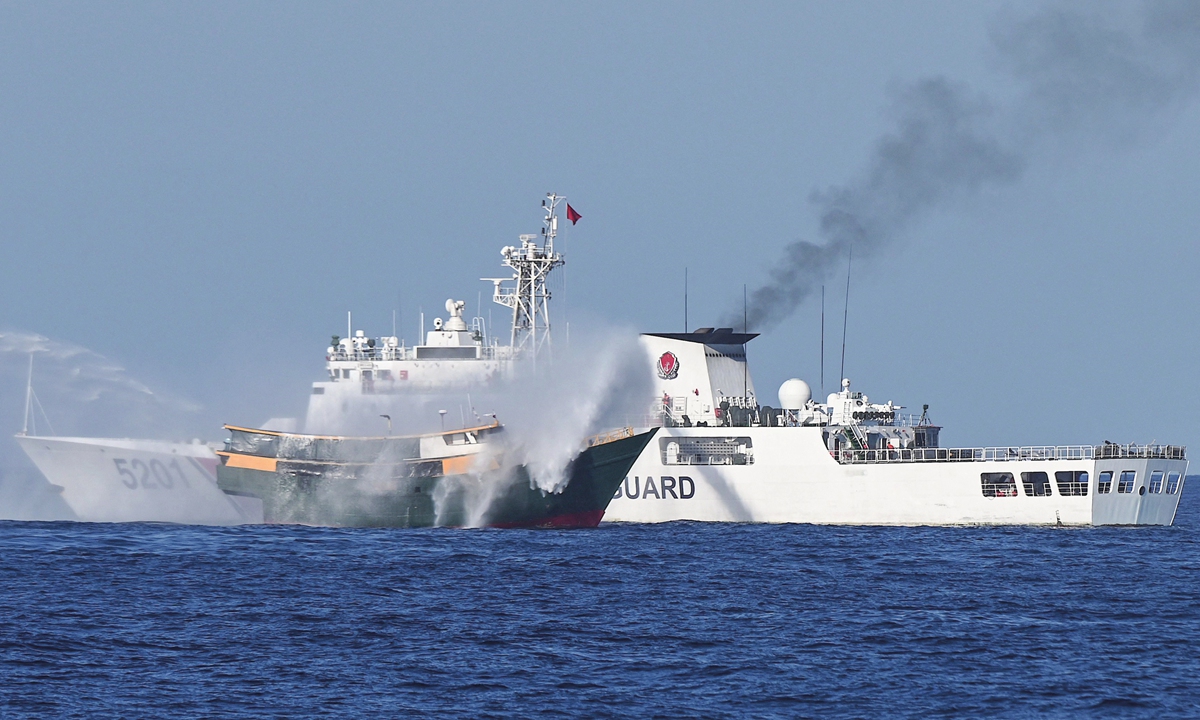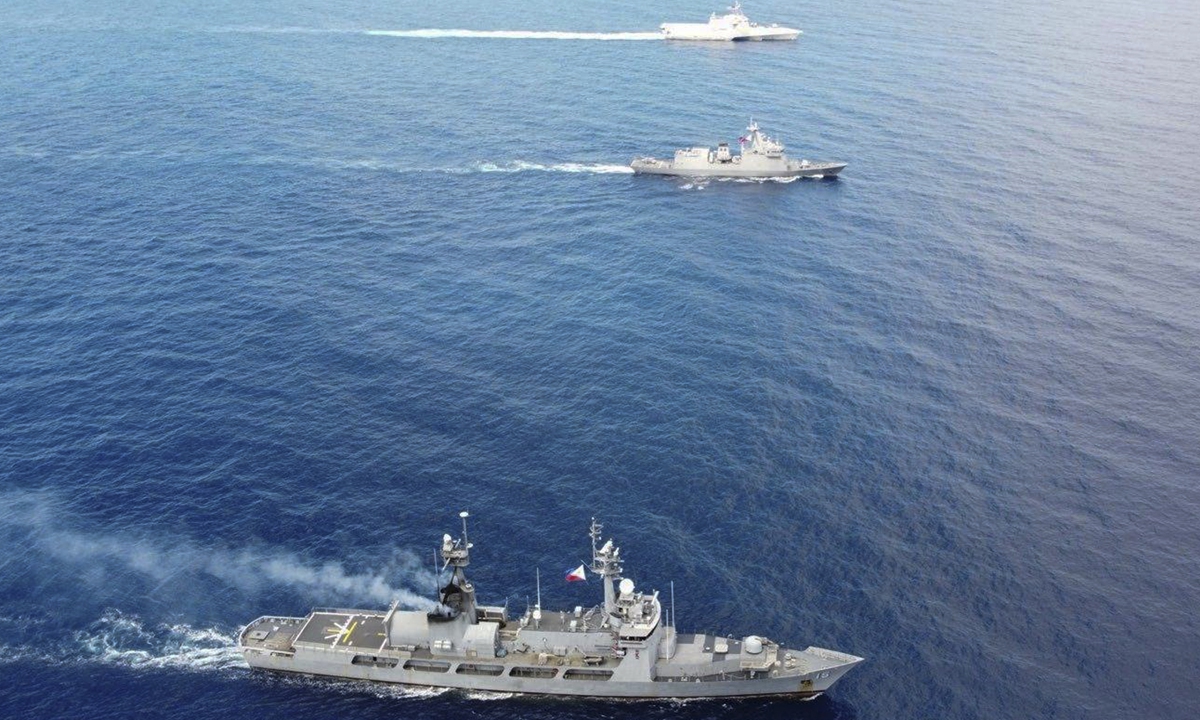
The PLA Navy holds a press conference in Qingdao on April 20, 2024. Photo: Huanqiu.com
China is showing the greatest sincerity and making concrete efforts in stabilizing situation and safeguarding peace in the West Pacific region, analysts said, as the People's Liberation Army (PLA) Navy holds a symposium to gather naval commanders and senior officers from navies around the globe to discuss maritime security from Sunday to Wednesday, while the US is about to conduct military drills with its ally the Philippines starting from Monday, which is bound to intensify the current tensions in the South China Sea.
The 19th Western Pacific Naval Symposium (WPNS) is scheduled to be held in Qingdao, Shandong Province from Sunday to Wednesday, with more than 180 foreign representatives from high-level delegations of 29 countries participating, including major leaders of the maritime defense departments of 20 countries, Qu Tao, a senior captain from the PLA Navy Staff Department, briefed the media at a press conference in Qingdao on Saturday.
After more than 30 years of development, the WPNS has become the regional naval multilateral cooperation mechanism to have produced the most achievements, the most vitality and has the greatest potential, according to Qu, adding that it is an important platform for navies to hold dialogue and to communicate, enhance mutual trust and deepen cooperation.
According to information previously released by the Ministry of National Defense, the navies (maritime defense departments) of 29 countries, including Australia, Cambodia, Chile, France, India, Indonesia, Japan, South Korea, Russia, the US, Pakistan and the UK, will send delegations to the WPNS.
Themed "Ocean with a Shared Destiny," naval (maritime defense departments) leaders from some 20 countries will speak at three sessions - "Global Security Initiative and Maritime Peace and Tranquility," "Maritime Security Cooperation and Maritime Order Based on International Law" and "Extensive Discussion, Co-construction and Sharing and Global Maritime Governance."
"By holding an event like the WPNS, China is trying its best to find common ground with countries in the region to seek opportunities for cooperation and to jointly safeguard maritime peace and stability," said a military expert and an attendee of the 19th WPNS who asked for anonymity.

Residents of Xiamen, East China's Fujian Province, visit the Chinese Navy's Type 052D destroyer Xiamen on April 21, 2024, as China will celebrate the 75th founding anniversary of the People's Liberation Army (PLA) Navy on April 23, 2024. Photo: VCG
However, unfortunately, a few countries, including the US, are showing provocative intention and actions in the South China Sea, which is harmful for regional peace, and that is in complete opposition to the theme of the WPNS, the expert told the Global Times on Sunday.
Before the "Balikatan" or "shoulder-to-shoulder" military drills between the Philippines and the US, which are scheduled from April 22 to May 10, even started, the Philippine military recently publicly announced that in the "sinking exercise" segment, the retired Philippine Navy replenishment tanker "BRP Lake Caliraya" would be selected as the target. This ship was originally manufactured in China and was used by Philippine enterprises as a civilian oil tanker.
It is the Philippines' only "Chinese-made naval asset." The Philippine military firmly stated the decision was "not intentional" and does not signify any specific country. It also stated that this joint military exercise is not targeting any foreign country, including China.
The Global Times editorial on Friday said this is a "ludicrous performance by Manila."
Pacific Fleet Commander Admiral Stephen Koehler will attend the WPNS on behalf of the US, according to a source familiar with the matter, making the event a chance to observe the latest military exchanges and engagement between China and the US, Reuters reported.

A Chinese coast guard ship uses a water cannon to expel a Philippine coast guard ship near the South China Sea during the Philippines'illegal re-supply mission on March 5, 2024. Photo: VCG
Different rolesChina is a founding member of the WPNS. Qu said that China has adhered to the principles of inclusiveness, equality and cooperation and participated constructively in forum affairs. China hosted the 14th WPNS in 2014.
In April 2014 when the PLA Navy hosted the 14th WPNS for the first time, Jonathan Greenert, then Chief of Naval Operations, and Harry B. Harris Jr., then Commander of the US Pacific Command, attended the forum. Normally, as member states, the naval (maritime defense departments) of the US, Japan, Russia and other countries will send naval leaders to participate in the WPNS.
Li Haidong, a professor at the China Foreign Affairs University, told the Global Times on Sunday that by observing the WPNS, regional countries will clearly learn the differences between China and the US in their handling of maritime security issues.
"We can see China's inclusiveness and openness from the event as [usually] it's very difficult to see the military delegates from both Russia and the US, as well as other major Western powers, but we can make this happen in China. Yet the US only invites its own allies to form little cliques or blocs to talk about maritime security issues by excluding other countries and even targeting other countries as potential enemies. Washington has always conducted military drills every year in different areas of this region, making it difficult for regional countries to resolve disputes and problems via diplomatic measures," Li noted.

The US and the Philippines conduct the so-called joint air and maritime patrols in the South China Sea, on November 23, 2023. Photo: Visual News
Earlier, Chinese Defense Ministry spokesperson Wu Qian said that the US is a member of the WPNS. In accordance with the requirements of the Forum's Charter, China has sent invitations to all member states and observer states. China looks forward to deepening exchanges and cooperation with other countries and making positive contributions to building a maritime community with a shared future.
The WPNS overlaps with the annual US-Philippines large-scale "shoulder-to-shoulder" joint military drills beginning on Monday, which will occur outside Philippine territorial waters for the first time. Analysts said that this presents an obvious comparison between how China and the US in handling maritime issues, showing which one is more peaceful and which one is more warlike.
During Saturday's press conference, Qu said the PLA Navy is willing to work with the navies of other countries to continue to adhere to multilateralism, advocate fairness and justice, help each other, cooperate with each other, build security and a shared future, work together to promote global and regional maritime governance, jointly respond to maritime security risks and challenges, and actively promote the building of a maritime community with a shared future.







